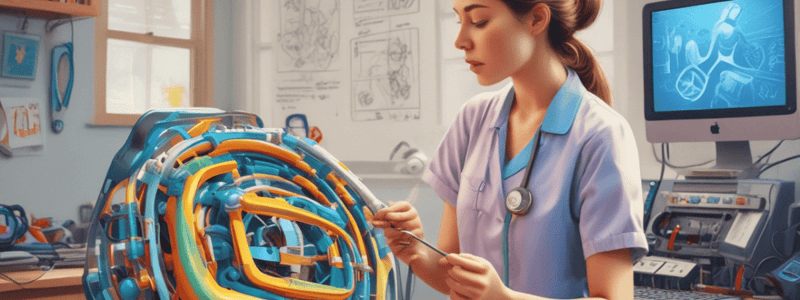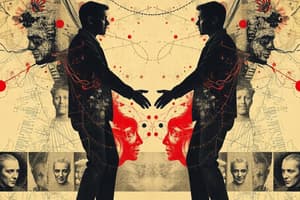Podcast
Questions and Answers
Which of the following is a key component of Schmidt's 'schema theory' of motor learning?
Which of the following is a key component of Schmidt's 'schema theory' of motor learning?
- The role of perceptions in motor learning
- Contextual interference in practice
- Sensory consequences of movement (correct)
- Transfer of learning between similar tasks
Which of the following is identified in the text as a benefit of using 'variable practice' in motor learning?
Which of the following is identified in the text as a benefit of using 'variable practice' in motor learning?
- Increased spontaneous use of skills for new tasks
- Improved transfer of learning between similar tasks
- Better generalization of learned skills (correct)
- All of the above
According to Newell's Ecological Theory, which of the following is a key factor in motor learning?
According to Newell's Ecological Theory, which of the following is a key factor in motor learning?
- Contextual interference in the practice environment
- Cognitive abilities of the learner
- Feedback on goal achievement (knowledge of results)
- Regulatory cues that sensitize the learner to relevant task features (correct)
Which type of learning transfer is described in the text as occurring 'more easily when tasks are similar'?
Which type of learning transfer is described in the text as occurring 'more easily when tasks are similar'?
The text discusses how individual characteristics, such as level of experience and intellectual ability, can influence what aspect of motor learning?
The text discusses how individual characteristics, such as level of experience and intellectual ability, can influence what aspect of motor learning?
Which of the following is a key component of Newell's Ecological Theory of motor learning?
Which of the following is a key component of Newell's Ecological Theory of motor learning?
What does the principle of neural plasticity refer to?
What does the principle of neural plasticity refer to?
In motor learning, what type of memory is needed for learning new movements?
In motor learning, what type of memory is needed for learning new movements?
Which factor is NOT considered in a systems approach according to the text?
Which factor is NOT considered in a systems approach according to the text?
What does the systems approach in occupational therapy include?
What does the systems approach in occupational therapy include?
Which type of learning naturally occurs during task performance?
Which type of learning naturally occurs during task performance?
What types of contexts are included within systems in occupational therapy?
What types of contexts are included within systems in occupational therapy?
What is the primary focus of the systems approach in occupational therapy?
What is the primary focus of the systems approach in occupational therapy?
Which of the following is an example of forced recovery in occupational therapy?
Which of the following is an example of forced recovery in occupational therapy?
According to the postulates of change in pediatrics, which of the following is most likely to improve motor skill development?
According to the postulates of change in pediatrics, which of the following is most likely to improve motor skill development?
Which of the following is a key factor in promoting sensorimotor learning according to the postulates of change?
Which of the following is a key factor in promoting sensorimotor learning according to the postulates of change?
Which of the following is an essential aspect of promoting psychosocial learning in occupational therapy?
Which of the following is an essential aspect of promoting psychosocial learning in occupational therapy?
Flashcards are hidden until you start studying
Study Notes
Systems Approach in Occupational Therapy
- Involves considering the best combination of remediation, adaptation, and compensation to promote client-identified level of functioning and fulfill desired roles.
Change and Recovery
- Change occurs through a learning process.
- Recovery can be: • Spontaneous, without intervention. • Forced recovery, through therapeutic intervention. • Adapted or functional recovery, achieved through altering methods or contexts.
Postulates of Change in Pediatrics
- Motor skills are more likely to improve when: • There is a match between the child's ability, task, and context. • The child understands expectations and receives clear guidance. • Independent problem-solving is encouraged. • There is a "just right" challenge (zone of proximal development).
Learning and Motor Skills
- Variable practice, using motor/perceptual skills under varying conditions, is effective for generalization of learning.
- Contextual interference, using motor perceptual skills in random order, increases spontaneous use for new tasks.
- Individual characteristics, such as level of experience and intellectual ability, influence motor learning.
- Transfer of learning occurs more easily when tasks are similar.
Schema Theory and Motor Learning
- Schmidt's schema theory uses sets of general rules that apply in a variety of contexts.
- A schema consists of four parts: • Initial situation • Parameters used • Outcome (knowledge of result) • Sensory consequence (how movement feels)
Newell's Ecological Theory
- Clarifies the role of perceptions in motor learning.
- Involves recognition of: • Goal or task • Regulatory cues (sensitizing to what is relevant to the task) • Knowledge of performance (KP): Feedback during performance • Knowledge of result (KR): Feedback on goal achievement
Assumptions of Motor Learning
- Based on the principle of neural plasticity, the ability of the nervous system to modify neural connections to perform more efficiently.
- Involves short-term (working memory) and long-term (save/retrieve) memory for learning new movements and lasting change.
Systems Theory in Occupational Therapy
- Includes consideration of: • Client factors (e.g., health condition, dysfunction or damage, age, gender, etc.) • Occupations: Meaningful or preferred tasks • Environment: All relevant contexts
- Systems include sensorimotor, psychosocial, cognitive, and performance contexts.
Studying That Suits You
Use AI to generate personalized quizzes and flashcards to suit your learning preferences.




